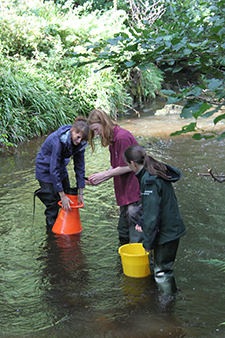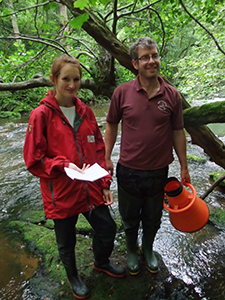Students wade in to save rare mussel
Biology students from York are helping to save a rare species of freshwater mussel facing extinction in a North Yorkshire river.

Sam Jones has just completed a placement with the North York Moors National Park Authority
Undergraduate Sam Jones has just completed a 12-month placement with the North York Moors National Park Authority where he worked with conservation experts fighting to save the endangered Freshwater Pearl Mussel in the River Esk.
Baby mussels
Sam helped efforts to introduce microscopic baby mussels, known as glochidia, into the river. The team hope the glochidia will latch onto the gills of young salmon or trout where they will grow harmlessly before dropping off and settling into the gravel river bed to continue their lengthy development.
Sam said: “We have so few mussels that the glochidia need a helping hand in reaching their target. With the help of experts from the Environment Agency, we caught fish by harmless electro-fishing and put them in containers on the bankside with collected fertile female mussels. The fish and the mussels were then returned to the Esk.
“It was wonderful to be able to put my theoretical biological knowledge to use for very real gains.”
Sam’s placement at the National Park has now been taken over by fellow York Biology student Emily Collins. Emily will continue to monitor the mussel project – and will return to the incubation site on the Esk in the spring to check on the progress of the microscopic baby molluscs.

Biology student Emily Collins will return to the incubation site on the Esk in the spring
A Panda situation
“We’ve got a bit of a Panda situation here because we know the chance of any of the glochidia attaching to the gills of the fish is very small,” said Emily. “Even if they do attach, they have to be dropped from the fish onto the river bed at the right time and in the right conditions to be sure of success.
“It’s an amazing project to be part of because, as students, we are literally holding the future of a lifeform in our hands. It’s unique.”
Sam and Emily have written a blog about their role in the pioneering project.
Freshwater pearl mussels can live for over 100 years making them one of our longest-lived invertebrates. Their numbers have dwindled as a result of pearl fishing and declining river water quality. The River Esk is home to the last surviving population in Yorkshire.
Sam and Emily are just two of around 40 students from the Department of Biology who take part in industrial placements every year as part of their degree programmes.
Images courtesy of North York Moors National Park Authority
